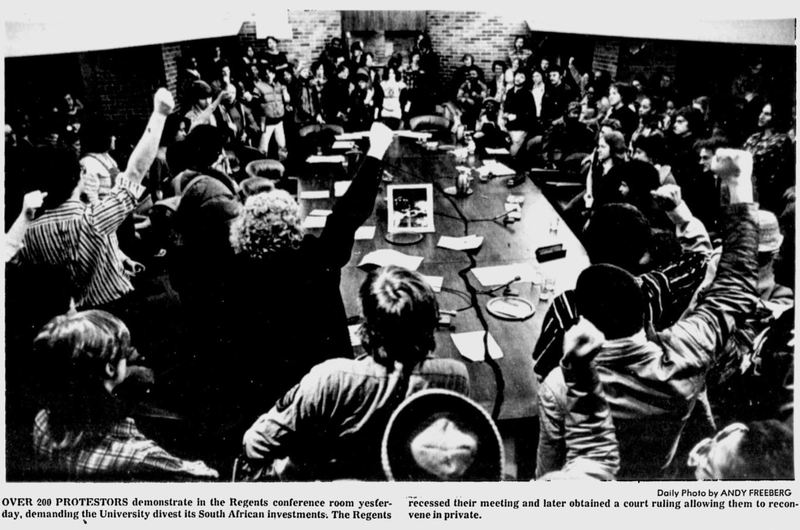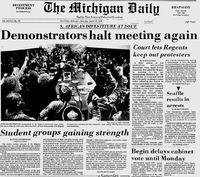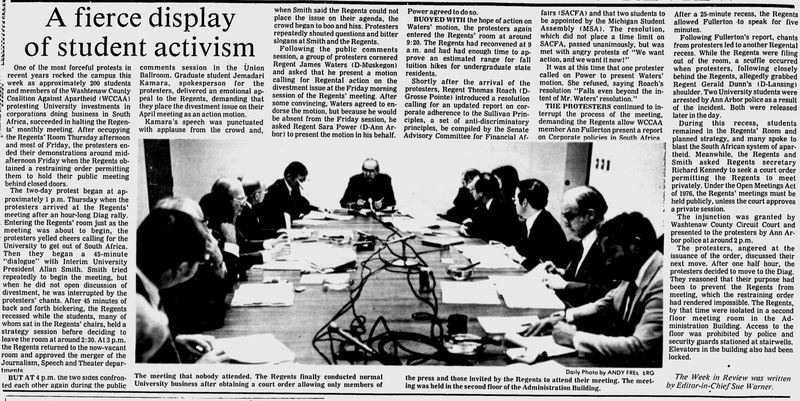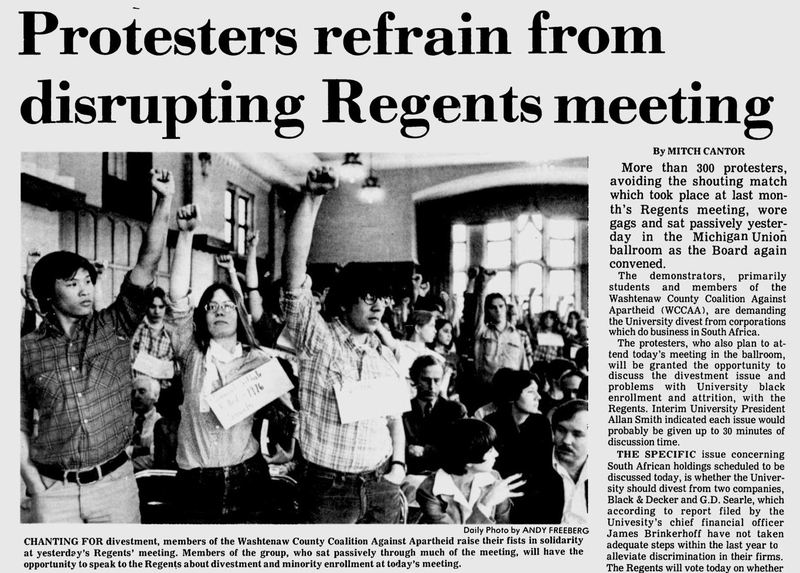Fallout from First Resolution: Regents' Meeting Protest and Beyond
Dissatisfaction with the Regents' March 16th, 1978 resolution continued throughout that year and into the winter semester of 1979. That spring saw significant clashes between the Washtenaw County Coalition Against Apartheid (WCCAA) and the UM Board of Regents. At the March Regents' meeting of 1979, the Regents refused to answer directly to the grievances of the Coalition, referring instead to the Senate Advisory Committee on Financial Affairs (SACFA). Anti-apartheid activists had already accused the committee's chair, Patricia Longe, of having a conflict of interest on the matter as she was a board member of both National Bank of Detroit and Warner Lambert and Manufacturers. An article about the March 1979 Regents meeting in The Michigan Daily quotes one of the protesting students: "People were tired of the system not resonding. . .We thought a little more pressure, and action, could make something happen."
Upset with the Regents' handling of the topic, the WCCAA and their allies pushed harder against the Board. At the March 15-16, 1979 Board of Regents meeting, the WCCAA staged a major protest. Over 200 protesters attended the meeting and demanded that the Regents immediately review UM's South Africa policy and divest its stockholdings. The activists continued to interupt the meeting with their calls for divestment, leading the Regents to take out a temporary restraining order against the Washtenaw County Coalition Against Apartheid. Additionally, two students were arrested. Hoping to halt the disruptions the WCCAA caused to their meetings, the Board of Regents appealed to the courts to allow them to hold closed meetings. The order forbade the WCCAA from interfering with the meetings, pending a verified complaint, and allowed the Regents to change from their regular meeting schedule and locations.
In response to the student protesters who disrupted the Regents' meeting, Interim University of Michigan President Allan F. Smith wrote a letter to the University community. In the letter, he refers to the protest as "intimidation and disruption [that sought] to displace ordered discussion and debate." He argues that the Regents 1978 resolution was adopted by following the proper course of action and carefully studying the issue. Smith argues the resolution "is a policy which is defensible in terms of rationality and in terms of its being recommended by knowledgeable persons." Even though the Regents agreed to review the policy, Smith says the activists were not satisfied. They demanded "action now," which Smith deemed inappropriate. Throughout the letter, Smith seems primarily concerned with the Regents following proper University procedure in their decision-making process. Divestment, he feels, needs to be reviewed by the proper committees and groups before a decision can be made. He goes on to criticize the Open Meetings Act because its leaves them with only two options for dealing with disruptions: "either abdication of responsibility for managing the affairs of the University or the use of forceful eviction of students." Smith concludes by saying he expects "the review of the investment policies to proceed in a proper fashion."
In response to the University's use of the courts to stop Regents' meeting demonstrations, the Coalition released a press statement on April 19, 1979, the day of a large, but quiet, protest at a Regents' meeting. At the protest, the students showed up wearing gags. In this press statement the WCCAA said on the gags that, “we are gagged today because; a) the Regents have used the courts to stifle the spirit of the Open Meetings Act; b) for two years the Board of Regents have avoided open discussion of divestment; c) in South Africa, to call for divestment is a violation of the Terrorism Act of 1967, which is punishable by a minimum sentence of 5 years and a maximum sentence of death”. April 20th was chosen for another demonstration because that day the Regents were voting on whether to sell stocks in Black and Decker Manufacturing Company and G.D. Searle and Company. The Regents voted against the divestment, triggering a larger protest from the WCCAA, which was ultimately successful when, in May of 1979, the University divested $227,647 from Black and Decker Manufacturing Company.
One of the founding members of the WCCAA, Heidi Gottfried, looked back in 2015 at the events leading up to their protests of the Regents' resolution and some of the actions they took during Regents' meetings, saying:
The University, which universities always do, set up a committee. . . And I was on the committee. It was faculty and students representing all the different constituencies and stakeholders in this particular issue. It wasn’t balanced in terms of points of view. I think there were two of us—Bob, the campus minister, and myself. And there was one faculty member, I think, who I don’t remember. We were sort of the minority view. That is, we were pushing for full divestment. The University adopted the Sullivan Principles and we fought against that adoption and we had good reasons for it. . . We were equipped to know why it was and we knew why the University should fully divest because as long as the business we were doing there we were still actively involved in the economy, they would not have the same impact necessary to shock, to force the government in South Africa to make that change—an economic shock to do that. This committee came up with a report that recommended the adoption of the Sullivan Principles. And myself and two others, the three of us, we wrote a minority report that was supposed to be the brief before the argument in favor of divestment. They tried to bury that minority report but we were good activists so we didn’t allow that to happen. There were, as you probably know, a series of takeovers of the administration building—we did all sorts of things to put pressure on the University. Then the University tried to close one of the Regents meetings. We then forced them because of the Sunshine Laws to open it so they had the meeting in the Union at one of the ballrooms. What we decided to do is. . . all of us mobilized. We walked in with. . .it seemed like there were a couple of hundred people, but I have no idea how many people were there, but the ballroom was full— students and faculty. We marched in silently with gags. We had made a tape which once we all assembled very quietly and peacefully and this kind of theater, this spectacle, was something that was very dramatic. They didn’t know what was going on, we weren’t talking, we weren’t yelling, we weren’t like our usual selves—we were very quiet and orderly. We all sat down and pushed the tape recorder and we explained why we felt that we were wearing the gags, why the University was trying to silence us, so that was that. Then the president at the time, Robben Fleming, presented the report with the recommendation of the majority on the committee. I then asked to be recognized so that I could read the minority report and Robben Fleming said no, I couldn’t read it, that it would be in the record. I said no, it needs to be read out loud so that it will literally be on the record—at the end of the record. And he refused to recognize me so I stood up anyways, took my gag off and began to read. He was not happy and he kept calling me out of order and I kept reading.I probably got through a page of the report but the idea was to just let people know that there was an opposition—and it was a strong opposition—and let them know what are principles were and it made our point. . . I don’t know what happened to call it off but then we marched out, probably yelling, maybe not yelling, but chanting of some sort. But the University never did change it’s policy but it was successful in the sense for education purposes—to let other students know; it was so dramatic that it was in all the newspapers, mostly local; and it gives inspiration to other movements around the country.
While the WCCAA and other groups would continue to protest apartheid and call for divestment, the Regents remained steadfast in maintaining their chosen course of action. For divestment to happen at the University of Michigan, there would need to be increased pressure on the Board of Regents. The Michigan Legislature would eventually provide it.
Sources for this page:
The Michigan Daily, Sept. 14, 1979.
The Michigan Daily, Sept. 22, 1979.




